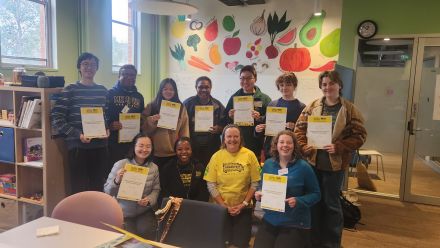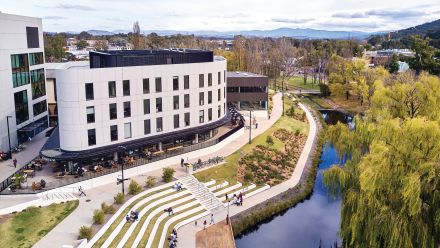EA variation vote detailed financial information
Dear members of the ANU community,
You will soon be invited to vote on a variation to the Enterprise Agreement to defer this year's pay rise to next year, and the July 2021 pay rise to July 2022.
I know this is a big decision, and you are hearing lots of viewpoints. I urge you to make your own decision. But before you do, please read the facts I have outlined below and refer to our online FAQs, which are being updated as questions come in and as we become aware of any places we need clarification. I encourage you to take a look.
In this message, I want to address two of the main areas of uncertainty directly:
- Our reserves and how we can use them
- How our savings target was reached
ANU financial reserves
Some analysis you may have seen does not explain constraints on our financial reserves correctly, so let me explain what is going on in as much detail as I can.
It is true and fortunate that we entered 2020 in a relatively strong financial position and, on paper, we might appear to have a large cash reserve. However, we cannot spend all of these funds to help with this crisis. I have written a detailed description with a figure which you can read separately by clicking here, but let me summarise.
On paper, our financial reserve is large, over $1.8 billion. Within that number, $629 million will be spent to help us keep operating this year. The remaining ~$1.2 billion is already committed, or is not ours to spend. It includes:
- $718 million is contained in our obligations to the Commonwealth Superannuation Scheme (CSS).
- $349 million is in protected endowments (philanthropic and other gifts), which we cannot spend for any purpose other than that for which they were provided.
- $120 million is retained to cover our staff leave entitlements.
- $30 million covers our Workers Compensation obligations.
So that's where the $1.8 billion in our financial reserves is. I wish the rumours were true and we had more money to help us through this unprecedented time. But let me be clear, even as we look at a bleak financial situation: saving jobs is my priority and I will do anything I can to keep as many staff as possible.
Click here to see the full picture.
What we must spend, and save, in 2020
Lots of colleagues are asking why we are trying to meet our previously stated savings targets. The waterfall diagram contains more detail, but the important thing to note when asking why we must make savings is that it costs around $250-$300 million per quarter to keep the University running. Our funds will be gone by the end of this year at the current 'burn rate'.
Under that scenario, we would go through the first three months of 2021 with bills to pay, an unstable financial environment surrounding us, and no money to spend in reserve. ANU Council has said, and I agree, that we must begin 2021 with our running costs for a quarter of the year - as close to $250 million as possible - in the bank, and that means using the next six months to find savings and additional income so we have that money available to us.
How will we find that ~$250 million? The first $150 million will come from a loan which will be used to pay for our unavoidable capital projects and one-off costs. As an aside, we will use an additional $50 million of that loan to pay for the costs associated with voluntary separations.
That leaves $100 million we need to find through other means this year. $75 million will come from deferring some costs to the future, by doing things like: buying equipment later or delaying projects; tightening our belts and finding ways to be more efficient; we may save some money by deferring this year's pay rise, if that is what staff choose to do; and we will need to lower our salary bill.
The rest will come from earning $25 million more than originally forecast. On the subject of revenue, you may have seen that we are working closely with the ACT Government on a small pilot to begin enabling some of our students overseas to return to campus. We are really keen to welcome our students back to campus and the pilot is focused on continuing students and those who are nearing graduation. But, importantly, the pilot will not generate any new income - these are continuing students who are already enrolled and have been studying remotely.
Looking beyond 2020, our financial shortfalls will continue. Our best prediction for 2021 is that we will earn almost the same amount of income as in 2020. Our financial options then will be even more limited, and we cannot just take out a larger loan and assume everything will be fine. The total salary savings required for next year depends on how much non-salary money we can save, and how much we can increase our income from our current calculations. Best indications are that we will need to achieve at least $70 million per year in salary savings for 2021 and beyond (a 10 per cent decrease from 2020). For reference, this is making the University the same size that it was at the end of 2017.
How deferring our pay rise might help
We spend two thirds of our money on salaries, so it is unavoidable that much of our savings will have to come from jobs. I want to save as many jobs as I can, and we can save more jobs if we defer the two per cent pay rise, which represents $13.5 million per year. This deferral will allow us to employ more staff next year than otherwise. How many more staff? The number of staff who will earn the saved $13.5 million. And that is guaranteed.
There is a judgment call about whether the pain caused by deferring our pay increase is worth the gain of being able to keep more staff employed at the University. I am not telling you to vote 'yes' or 'no', I am asking that you make an informed decision and vote accordingly. My sense is that the jobs saved by the deferral are worth the pain. Unfortunately, a deferral will not solve all our problems: I will still have to address the financial issues facing the University, whichever way our campus votes.
I am committed to providing ongoing updates on our financial position. As new information or updates come to light, I will share them with you. I will never intentionally mislead you about our finances, or anything else for that matter. This is my community too, and all the energy I have right now is going in to finding a way through this crisis, so we emerge the strong institution Australia needs in the post-COVID-19 world.
Further information
We have held three information sessions for staff from 11-15 June. These recordings are available on our website. We have also updated our FAQs on our finances and the variation to the Enterprise Agreement to address your questions. This includes more information on voting processes; suggestions and feedback to save money; job security; and equity and support. Plus, I will host a staff forum next Tuesday 23 June at 1pm, which I invite you to join. We are doing our best to keep you informed. That can mean a blizzard of information, so thank you for staying engaged.
Brian


